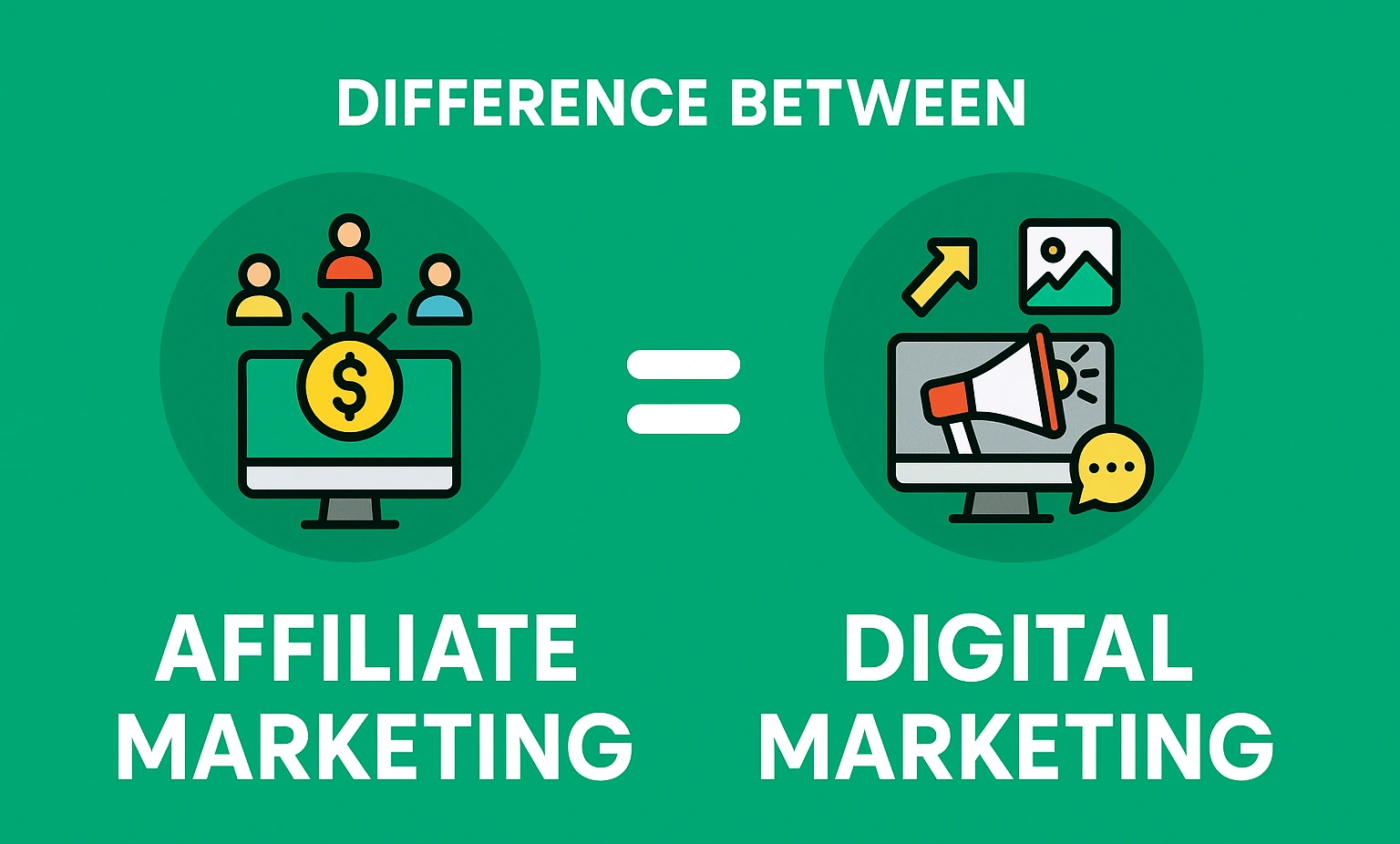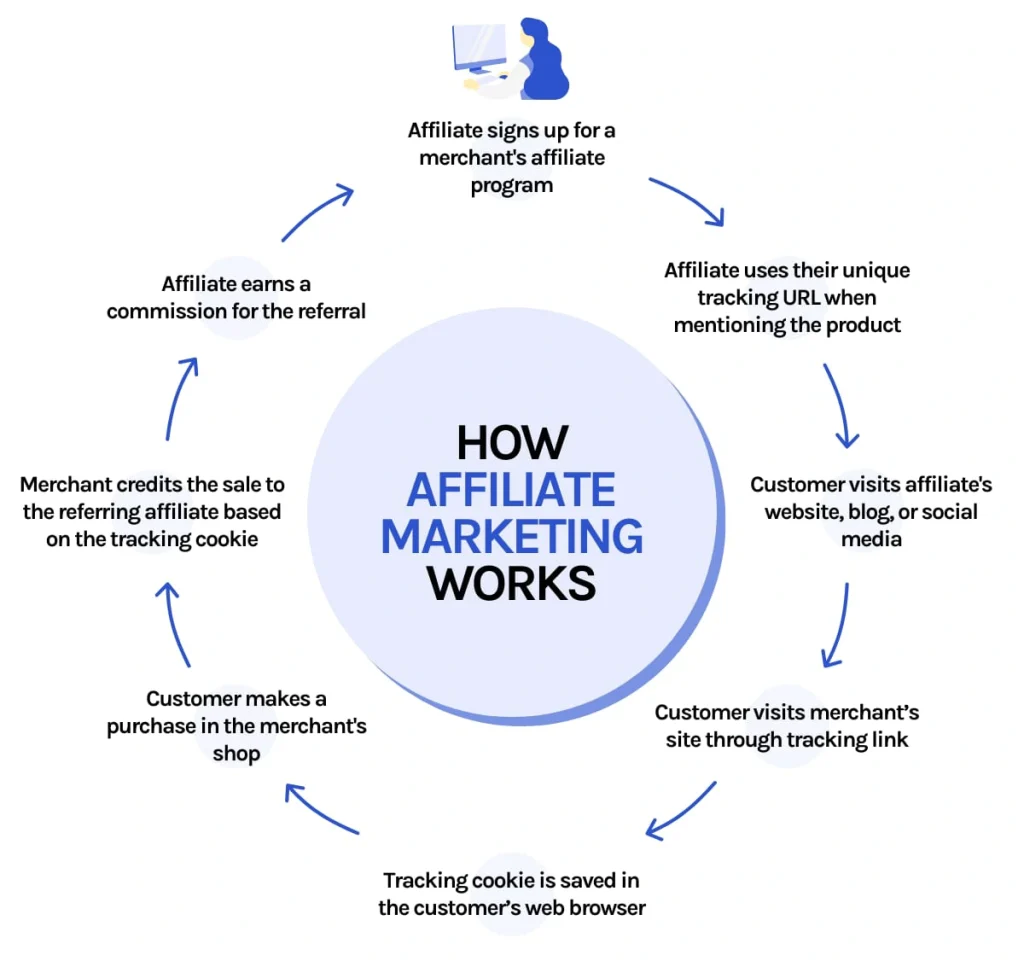Wondering what is the difference between affiliate marketing and digital marketing? Learn the key facts and choose the right path for you.

Ever sat there wondering, what is the difference between affiliate marketing and digital marketing? I have.
I remember one night, years back, sitting in my cramped apartment, staring at my laptop screen way past midnight. I had just binged hours of YouTube videos, blog posts, and podcasts.
Everyone threw around these big marketing terms like they expected you to just get it. Affiliate marketing. Digital marketing. Content marketing.
It all blurred together until it felt like one giant mess of words that didn’t make sense. I felt frustrated, maybe even a little dumb—like I was the only one not getting it.
But here’s the thing: it’s not you. It’s the way people explain it. They overcomplicate stuff that’s actually pretty simple.
You’re here because you want to understand it clearly, quickly, and without complications. You want to know:
– What actually separates affiliate marketing from digital marketing?
– Are they the same thing?
– Can you do one without the other?
– Which one should you even focus on?
Good questions.
And the answers are easier than you think.
Today, I’m going to break it all down in plain words with real examples, like what I wish someone had done for me when I first started.
By the end of this, you’ll finally have the full picture—and you’ll feel confident knowing exactly where you stand.
Let’s dive in.
Key Takeaways:
- Affiliate marketing means promoting someone else’s product and earning a commission.
- Digital marketing covers promoting your own business through online channels like ads, SEO, and email.
- The main difference is ownership: affiliates sell for others; digital marketers sell their own stuff.
- Affiliate marketing is easier to start but depends on finding good products and programs.
- Digital marketing gives you full control over branding and customer relationships but takes more upfront work.
- You can earn faster with affiliate marketing if you’re good at traffic and conversion.
- If you want long-term growth and control, building your own digital marketing strategy is the better move.
Quick Overview: Affiliate Marketing vs Digital Marketing
Before we dive deep, let’s keep it simple.
Affiliate marketing is about getting paid to recommend other people’s products or services. You don’t own the product. You’re like the middleman or the trusted friend—who says, “Hey, I tried this. You should too.” And when someone listens and buys through your link, you earn a commission.
Digital marketing is the whole toolbox businesses use to sell online. It’s everything from Facebook ads to SEO, email blasts, YouTube videos, Google search results…you name it. If it happens on a screen and helps sell something, it’s digital marketing.
Now, here’s the honest truth:
Affiliate marketing lives inside digital marketing. It’s one specific way to make money online. But digital marketing is the full playground—affiliate marketing is just one of the rides.
When I first started, I kept mixing them up too. It felt like trying to tell the difference between a square and a rectangle—kind of the same but not really. Stick with me for a few minutes.
We’ll break it down in plain words, no fancy talk needed.
What Is Affiliate Marketing?
Affiliate marketing is simple:
You promote someone else’s product or service, and when people buy through your special link, you earn a commission. You don’t create the product. You don’t handle customer service. You’re just the person connecting buyers to sellers—and getting paid for it.

Think about it like this:
You love a new set of headphones you bought on Amazon. You tell your friends about them. Now imagine if Amazon gave you $10 every time one of your friends bought those headphones because of your recommendation.
That’s affiliate marketing in real life. You help a company make a sale, they thank you with a piece of the profit.
Here’s what makes affiliate marketing stand out:
- No product ownership: You don’t need to invent, build, or ship anything.
- Commission-based: You only get paid when someone buys through your link.
- Third-party sales: You’re promoting products made by other businesses, not your own.
When I first heard about it, it almost sounded too easy. But once you dig in, you realize it’s about building trust and sharing real value—not just tossing links everywhere and hoping for the best.
Recommended Reading: Can You Really Make Money with Affiliate Marketing? Or Is It Just Hype?
What Is Digital Marketing?
Digital marketing is everything a business does online to grab attention, build trust, and make sales.
It’s not just one thing—it’s a mix of tools and strategies working together to get people to notice and buy.
Here’s a simple picture:
Imagine you start an online store selling handmade candles. To get customers, you run Facebook ads showing off your best scents. You post videos on Instagram of how you make them. You send emails offering a 10% discount. Maybe you even write blog posts about the benefits of natural candles and get found on Google.
All of that—ads, social posts, emails, blogging—is digital marketing in action.
It covers a lot of ground, like:
- Social media marketing (Facebook, Instagram, TikTok posts and ads)
- Email marketing (newsletters, promos straight to inboxes)
- Search engine optimization (SEO) (getting your site to show up on Google)
- Paid advertising (Google ads, YouTube ads, social media ads)
- Content marketing (blogging, videos, podcasts)
- Affiliate Marketing
…and many more.

Here’s what makes digital marketing different:
- Brand control: You own the brand, the story, and how people experience it.
- Direct customer sales: You’re the one selling to the customer—no middleman needed.
- Multi-channel approach: You use different platforms to reach people wherever they spend time online.
When I first dipped my toes into digital marketing, it felt like trying to juggle five balls at once.
One day I was writing emails, the next learning Facebook ads, the next trying to figure out SEO.
It took a while, but I realized something important:
You don’t have to do everything at once. Pick a few channels where your people are hanging out and focus there first.
Then build from there.
Digital marketing sounds big because it is. But when you break it down into small, real steps, it becomes a lot more doable.
Major Differences You Need to Know
Still asking yourself what is the difference between affiliate marketing and digital marketing?
Now that you’ve got a clear picture of both, let’s line them up side by side. This will save you the headaches I had early on—bouncing back and forth, second-guessing what made each one different.
Here’s a simple breakdown:
| Feature | Affiliate Marketing | Digital Marketing |
|---|---|---|
| Ownership | You promote other people’s products. | You own the product, service, or brand. |
| Earning Method | Commissions on sales made through your link. | Direct profits from selling your own product or service. |
| Investment Needed | Very low to start (sometimes just a website or free traffic methods). | Can be high (ads, websites, branding, product creation). |
| Time to See Results | Can be fast with the right traffic, but often takes months to build trust. | Depends on the strategy. Paid ads can be quick; organic methods like SEO take longer. |
| Skillsets Required | Content creation, SEO, basic sales skills, audience building. | Broader set: copywriting, ad management, email marketing, branding, analytics. |
| Customer Relationship | You usually don’t own the customer list. | You control and build your customer base directly. |
| Risk Level | Low—you’re not tied to product success or failure. | Higher—you’re responsible for everything from start to finish. |
| Long-Term Growth | You’re tied to the affiliate programs’ rules and changes. | You own the business and can scale it on your terms. |
I’m gonna be real with you—there’s no “better” choice across the board.
It depends on your goals, your patience level, and how much you’re willing (or able) to put into it upfront.
When I was starting out, affiliate marketing made sense to me. I didn’t have the budget or experience to build a whole brand. But if you’ve got a product idea burning in your chest, digital marketing might be where you plant your flag.
Recommended Reading: How Much Money Do You Need to Start Affiliate Marketing?
Pros and Cons of Each Approach
Both affiliate marketing and digital marketing can open doors. But neither one is perfect. Each has its own wins and headaches.
Here’s the real story, laid out clearly:
Affiliate Marketing
| Pros | Cons |
|---|---|
| Easy and cheap to start | You don’t control the product or pricing |
| No need to create a product | Commission cuts can happen anytime |
| Work from anywhere | Harder to build a long-term brand |
| Tons of niches to pick from | Heavy competition in popular niches |
| Passive income potential | You’re stuck with affiliate program rules |
Digital Marketing
| Pros | Cons |
|---|---|
| Full control over your brand and products | Higher upfront costs |
| Direct access to your customer list | Steeper learning curve |
| Higher profit margins | Takes more time to build trust |
| Easier to scale long-term | You’re responsible for everything |
| More ways to market and grow | Mistakes can get expensive fast |
Remember both paths can make you money. But they come with different types of work, risks, and rewards.
Pro Tip: If you’re just getting started, affiliate marketing is a great low-risk way to test the waters. It lets you learn the ropes without investing too much upfront.
Which One Fits You Best?
I get it. You’re still unsure about which route to take.
Here’s the thing:
If you’re asking yourself whether affiliate marketing or digital marketing is right for you, it all comes down to what you want to do and how much you’re willing to put in.
So, ask yourself a few key questions:
- “I don’t want to create a product.”
Go affiliate. No need to worry about building or managing products. Just promote what’s already out there. - “I want full control.”
Go digital marketing. You get to own the brand, control the messaging, and build customer relationships.
Questions to ask yourself:
- Do I want to get started quickly without a lot of upfront costs?
(If yes, affiliate marketing is the way to go.) - Am I okay with investing time and money to build something of my own?
(If yes, digital marketing gives you more control and long-term potential.) - How much risk am I comfortable with?
(Affiliate marketing is low-risk. Digital marketing requires more responsibility but offers bigger rewards down the road.)
Ultimately, it’s about your goals and how much you want to invest—time, money, and energy.
Conclusion
By now, you should have a solid understanding of what sets affiliate marketing and digital marketing apart. Knowing the difference gives you the clarity to choose the right strategy based on your goals, resources, and comfort with risk.
It’s important to remember that both paths can lead to success—just in different ways. Affiliate marketing offers a low-risk, quick entry point, while digital marketing gives you full control and scalability for long-term growth.
Start small, but start today. Don’t wait for everything to be perfect. Whether you go with affiliate marketing, digital marketing, or a combination of both, taking action is the key. Each step you take moves you closer to building the online business you’ve envisioned.
Frequently Asked Questions
What is the difference between affiliate marketing and digital marketing?
The difference between affiliate marketing and digital marketing lies mainly in control and approach. In affiliate marketing, you promote other companies’ products and earn a commission. You don’t own the product or customer base. Digital marketing, on the other hand, involves promoting your own products or services through various channels like email, social media, SEO, and paid ads. You have full control over the brand, product, and customer relationships. Affiliate marketing is often simpler and lower-risk, while digital marketing offers greater long-term potential but requires more investment and effort.
Which is better, affiliate marketing or digital marketing?
Choosing between affiliate marketing and digital marketing depends on your goals. If you want to get started quickly with minimal investment, affiliate marketing is a great choice. You promote others’ products, earn commissions, and focus on building an audience. If you’re looking for more control over your business and are willing to invest more time and money, digital marketing might be better. Digital marketing offers scalability and higher profit potential but comes with more responsibility and a higher learning curve.
Can I do affiliate marketing and digital marketing at the same time?
Yes, you can definitely do both affiliate marketing and digital marketing at the same time. Many marketers use affiliate marketing to start earning income and build an audience while working on their own digital marketing strategies. Affiliate marketing and digital marketing can complement each other—affiliate marketing gives you quick wins and passive income, while digital marketing lets you scale by building your own products and customer base. Just be sure to focus on one approach first before expanding into the other.
How does affiliate marketing compare to digital marketing in terms of cost?
The cost difference between affiliate marketing and digital marketing is significant. Affiliate marketing is much cheaper to start, requiring little more than a website or a platform to promote products. You typically only pay for hosting, content, and marketing tools. Digital marketing, however, involves costs like advertising budgets, website creation, product development, and email marketing software. While affiliate marketing has minimal upfront costs, digital marketing often requires more investment to scale and build your brand.
Is affiliate marketing a form of digital marketing?
Yes, affiliate marketing is a form of digital marketing. It falls under the umbrella of digital marketing because it involves promoting products or services online to earn commissions. While digital marketing can include strategies like content marketing, email marketing, and social media ads, affiliate marketing specifically focuses on promoting third-party products and earning a commission for each sale made through your efforts. Essentially, affiliate marketing is one type of digital marketing, but not all digital marketing is affiliate marketing.






